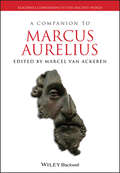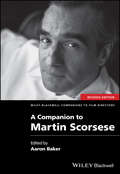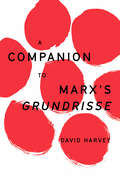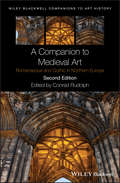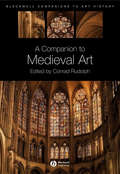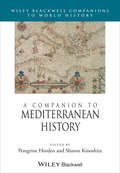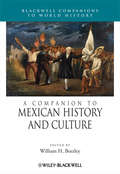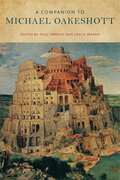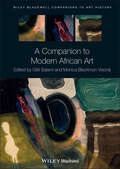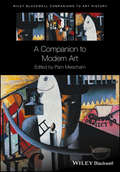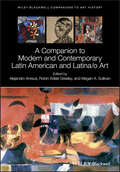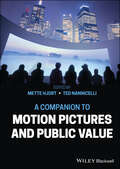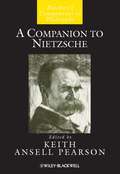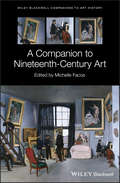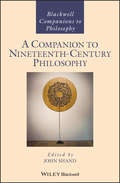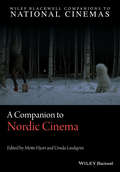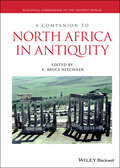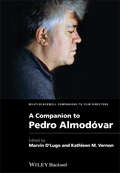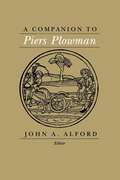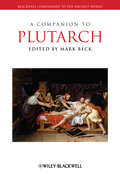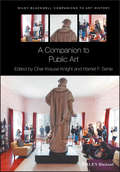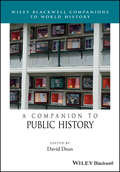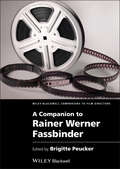- Table View
- List View
A Companion to Marcus Aurelius (Blackwell Companions to the Ancient World #185)
by Marcel Van AckerenA Companion to Marcus Aurelius presents the first comprehensive collection of essays to explore all essential facets relating to contemporary Marcus Aurelius studies. First collection of its kind to commission new state-of-the-art scholarship on Marcus Aurelius Features readings that cover all aspects of Marcus Aurelius, including source material, biographical information, and writings Contributions from an international cast of top Aurelius scholars Addresses evolving aspects of the reception of the Meditations
A Companion to Martin Scorsese (Wiley Blackwell Companions to Film Directors)
by Aaron BakerA Companion to Martin Scorsese is a comprehensive collection of original essays assessing the career of one of America’s most prominent contemporary filmmakers. Contains contributions from prominent scholars in North America and Europe that use a variety of analytic approaches Offers fresh interpretations of some of Scorsese’s most influential films, including Mean Streets, Taxi Driver, Raging Bull, Goodfellas, Gangs of New York, and Hugo Considers Scorsese's place within the history of American and world cinema; his work in relation to auteur theory; the use of popular music and various themes such as violence, ethnicity, religion, sexuality, gender, and race in his films, and more
A Companion to Marx's Grundrisse
by David HarveyDavid Harvey tackles Marx's notebooks that have spawned wide-ranging and raging controversiesWhen leading scholar of Marx, Roman Rosdolsky, first encountered the virtually unknown text of Marx&’s Grundrisse - his preparatory work for his masterpiece Das Capital - in the 1950s in New York Public Library, he recognized it as &“a work of fundamental importance,&” but declared &“its unusual form&” and &“obscure manner of expression, made it far from suitable for reaching a wide circle of readers.&”David Harvey&’s Companion to Marx&’s Grundrisse builds upon his widely acclaimed companions to the first and second volumes of Capital in a way that will reach as wide an audience as possible. Marx&’s stated ambition for this text - where he was thinking aloud about some of possible metamorphoses of capitalism - is to reveal &“the exact development of the concept of capital as the fundamental concept of modern economics, just as capital itself is the foundation of bourgeois society.&” While respecting Marx&’s desire to &“bring out all the contradictions of bourgeois production, as well as the boundary where it drives beyond itself,&” David Harvey also pithily illustrates the relevance of Marx&’s text to understanding the troubled state of contemporary capitalism.
A Companion to Medieval Art: Romanesque and Gothic in Northern Europe (Blackwell Companions to Art History #1)
by Dana ArnoldA fully updated and comprehensive companion to Romanesque and Gothic art history This definitive reference brings together cutting-edge scholarship devoted to the Romanesque and Gothic traditions in Northern Europe and provides a clear analytical survey of what is happening in this major area of Western art history. The volume comprises original theoretical, historical, and historiographic essays written by renowned and emergent scholars who discuss the vibrancy of medieval art from both thematic and sub-disciplinary perspectives. Part of the Blackwell Companions to Art History, A Companion to Medieval Art, Second Edition features an international and ambitious range of contributions covering reception, formalism, Gregory the Great, pilgrimage art, gender, patronage, marginalized images, the concept of spolia, manuscript illumination, stained glass, Cistercian architecture, art of the crusader states, and more. Newly revised edition of a highly successful companion, including 11 new articles Comprehensive coverage ranging from vision, materiality, and the artist through to architecture, sculpture, and painting Contains full-color illustrations throughout, plus notes on the book’s many distinguished contributors A Companion to Medieval Art: Romanesque and Gothic in Northern Europe, Second Edition is an exciting and varied study that provides essential reading for students and teachers of Medieval art.
A Companion to Medieval Art: Romanesque and Gothic in Northern Europe (Blackwell Companions to Art History #12)
by Conrad RudolphA Companion to Medieval Art brings together cutting-edge scholarship devoted to the Romanesque and Gothic traditions in Northern Europe. Brings together cutting-edge scholarship devoted to the Romanesque and Gothic traditions in Northern Europe. Contains over 30 original theoretical, historical, and historiographic essays by renowned and emergent scholars. Covers the vibrancy of medieval art from both thematic and sub-disciplinary perspectives. Features an international and ambitious range - from reception, Gregory the Great, collecting, and pilgrimage art, to gender, patronage, the marginal, spolia, and manuscript illumination.
A Companion to Mediterranean History (Wiley Blackwell Companions to World History #20)
by Sharon Kinoshita Peregrine HordenA Companion to Mediterranean History presents a wide-ranging overview of this vibrant field of historical research, drawing together scholars from a range of disciplines to discuss the development of the region from Neolithic times to the present. Provides a valuable introduction to current debates on Mediterranean history and helps define the field for a new generation Covers developments in the Mediterranean world from Neolithic times to the modern era Enables fruitful dialogue among a wide range of disciplines, including history, archaeology, art, literature, and anthropology
A Companion to Mexican History and Culture (Wiley Blackwell Companions to World History #15)
by William H. BeezleyA Companion to Mexican History and Culture features 40 essays contributed by international scholars that incorporate ethnic, gender, environmental, and cultural studies to reveal a richer portrait of the Mexican experience, from the earliest peoples to the present. Features the latest scholarship on Mexican history and culture by an array of international scholars Essays are separated into sections on the four major chronological eras Discusses recent historical interpretations with critical historiographical sources, and is enriched by cultural analysis, ethnic and gender studies, and visual evidence The first volume to incorporate a discussion of popular music in political analysis This book is the receipient of the 2013 Michael C. Meyer Special Recognition Award from the Rocky Mountain Conference on Latin American Studies.
A Companion to Michael Oakeshott
by Paul Franco Leslie MarshMichael Oakeshott has long been recognized as one of the most important political philosophers of the twentieth century, but until now no single volume has been able to examine all the facets of his wide-ranging philosophy with sufficient depth, expertise, and authority. The essays collected here cover all aspects of Oakeshott’s thought, from his theory of knowledge and philosophies of history, religion, art, and education to his reflections on morality, politics, and law. Aside from the editors, the contributors are Corey Abel, David Boucher, Elizabeth Corey, Robert Devigne, Timothy Fuller, Steven Gerencser, Robert Grant, Noel Malcolm, Kenneth McIntyre, Kenneth Minogue, Noël O’Sullivan, Geoffrey Thomas, and Martyn Thompson.
A Companion to Michael Oakeshott
by Paul Franco, Leslie MarshMichael Oakeshott has long been recognized as one of the most important political philosophers of the twentieth century, but until now no single volume has been able to examine all the facets of his wide-ranging philosophy with sufficient depth, expertise, and authority. The essays collected here cover all aspects of Oakeshott’s thought, from his theory of knowledge and philosophies of history, religion, art, and education to his reflections on morality, politics, and law. Aside from the editors, the contributors are Corey Abel, David Boucher, Elizabeth Corey, Robert Devigne, Timothy Fuller, Steven Gerencser, Robert Grant, Noel Malcolm, Kenneth McIntyre, Kenneth Minogue, Noël O’Sullivan, Geoffrey Thomas, and Martyn Thompson.
A Companion to Modern African Art (Blackwell Companions to Art History)
by Dana ArnoldOffering a wealth of perspectives on African modern and Modernist art from the mid-nineteenth century to the present, this new Companion features essays by African, European, and North American authors who assess the work of individual artists as well as exploring broader themes such as discoveries of new technologies and globalization. A pioneering continent-based assessment of modern art and modernity across Africa Includes original and previously unpublished fieldwork-based material Features new and complex theoretical arguments about the nature of modernity and Modernism Addresses a widely acknowledged gap in the literature on African Art
A Companion to Modern Art (Blackwell Companions to Art History)
by Dana ArnoldA Companion to Modern Art presents a series of original essays by international and interdisciplinary authors who offer a comprehensive overview of the origins and evolution of artistic works, movements, approaches, influences, and legacies of Modern Art. Presents a contemporary debate and dialogue rather than a seamless consensus on Modern Art Aims for reader accessibility by highlighting a plurality of approaches and voices in the field Presents Modern Art’s foundational philosophic ideas and practices, as well as the complexities of key artists such as Cezanne and Picasso, and those who straddled the modern and contemporary Looks at the historical reception of Modern Art, in addition to the latest insights of art historians, curators, and critics to artists, educators, and more
A Companion to Modern and Contemporary Latin American and Latina/o Art (Blackwell Companions to Art History)
by Dana ArnoldIn-depth scholarship on the central artists, movements, and themes of Latin American art, from the Mexican revolution to the present A Companion to Modern and Contemporary Latin American and Latinx Art consists of over 30 never-before-published essays on the crucial historical and theoretical issues that have framed our understanding of art in Latin America. This book has a uniquely inclusive focus that includes both Spanish-speaking Caribbean and contemporary Latinx art in the United States. Influential critics of the 20th century are also covered, with an emphasis on their effect on the development of artistic movements. By providing in-depth explorations of central artists and issues, alongside cross-references to illustrations in major textbooks, this volume provides an excellent complement to wider surveys of Latin American and Latinx art. Readers will engage with the latest scholarship on each of five distinct historical periods, plus broader theoretical and historical trends that continue to influence how we understand Latinx, Indigenous, and Latin American art today. The book’s areas of focus include: The development of avant-garde art in the urban centers of Latin America from 1910-1945 The rise of abstraction during the Cold War and the internationalization of Latin American art from 1945-1959 The influence of the political upheavals of the 1960s on art and art theory in Latin America The rise of conceptual art as a response to dictatorship and social violence in the 1970s and 1980s The contemporary era of neoliberalism and globalization in Latin American and Latino Art, 1990-2010 With its comprehensive approach and informative structure, A Companion to Modern and Contemporary Latin American and Latinx Art is an excellent resource for advanced students in Latin American culture and art. It is also a valuable reference for aspiring scholars in the field.
A Companion to Motion Pictures and Public Value
by Mette Hjort Ted NannicelliA singular collection of original essays exploring the varied intersections of motion pictures and public value A Companion to Motion Pictures and Public Value presents a cross-disciplinary investigation of the past, present, and possible future contributions of the moving image to the public good. This unique volume explores the direct and indirect public value developed through motion pictures of different types, genres, and screening sites. Essays by world-renowned scholars from diverse disciplines present original conceptual work, philosophical arguments, historical discussion, empirical research, and specific case studies. Divided into seven thematically organized sections, the Companion identifies the various kinds of values that motion pictures can deliver, amongst them artistic, ethical, environmental, cultural, political, cognitive, and spiritual value. Each section includes an introduction in which the editors outline main themes and highlight connections between individual chapters. Throughout the text, probing essays interrogate the issue of public value as it relates to the cinema and provide insight into how motion pictures play a positive role in human life and society. Featuring original research essays on a pioneering topic, this innovative reference text: Brings together work by expert authors in disciplines such as Philosophy, Political Science, Cultural Studies, Film Studies, Sociology, and Environmental Studies Discusses a variety of institutional landscapes, policy formations, and types and styles of filmmaking Provides wide and inclusive coverage of cinema’s relation to public value in Africa, Asia, China, Europe, the Middle East, and the Americas Explores the role of motion pictures in community formation, nation building, and the construction of good societies Covers new and emerging topics such as cinema-based fields focused on health and wellbeingA Companion to Motion Pictures and Public Value is an ideal textbook for advanced undergraduate and graduate courses in Film, Media, and Cultural Studies, and is a valuable resource for scholars across a variety of disciplines
A Companion to Nazi Germany (Wiley Blackwell Companions to World History)
by Shelley Baranowski Armin Nolzen Claus‐Christian W. SzejnmannA Deep Exploration of the Rise, Reign, and Legacy of the Third Reich For its brief existence, National Socialist Germany was one of the most destructive regimes in the history of humankind. Since that time, scholarly debate about its causes has volleyed continuously between the effects of political and military decisions, pathological development, or modernity gone awry. Was terror the defining force of rule, or was popular consent critical to sustaining the movement? Were the German people sympathetic to Nazi ideology, or were they radicalized by social manipulation and powerful propaganda? Was the “Final Solution” the motivation for the Third Reich’s rise to power, or simply the outcome? A Companion to Nazi Germany addresses these crucial questions with historical insight from the Nazi Party’s emergence in the 1920s through its postwar repercussions. From the theory and context that gave rise to the movement, through its structural, cultural, economic, and social impacts, to the era’s lasting legacy, this book offers an in-depth examination of modern history’s most infamous reign. Assesses the historiography of Nazism and the prehistory of the regime Provides deep insight into labor, education, research, and home life amidst the Third Reich’s ideological imperatives Describes how the Third Reich affected business, the economy, and the culture, including sports, entertainment, and religion Delves into the social militarization in the lead-up to war, and examines the social and historical complexities that allowed genocide to take place Shows how modern-day Germany confronts and deals with its recent history Today’s political climate highlights the critical need to understand how radical nationalist movements gain an audience, then followers, then power. While historical analogy can be a faulty basis for analyzing current events, there is no doubt that examining the parallels can lead to some important questions about the present. Exploring key motivations, environments, and cause and effect, this book provides essential perspective as radical nationalist movements have once again reemerged in many parts of the world.
A Companion to Nietzsche (Blackwell Companions to Philosophy #120)
by Keith Ansell PearsonA Companion to Nietzsche provides a comprehensive guide to all the main aspects of Nietzsche's philosophy, profiling the most recent research and trends in scholarship. Brings together an international roster of both rising stars and established scholars, including many of the leading commentators and interpreters of Nietzsche. Showcases the latest trends in Nietzsche scholarship, such as the renewed focus on Nietzsche’s philosophy of time, of nature, and of life. Includes clearly organized sections on Art, Nature, and Individuation; Nietzsche's New Philosophy of the Future; Eternal Recurrence, the Overhuman, and Nihilism; Philosophy of Mind; Philosophy and Genealogy; Ethics; Politics; Aesthetics; Evolution and Life. Features fresh treatments of Nietzsche’s core and enigmatic doctrines.
A Companion to Nineteenth-Century Art (Blackwell Companions to Art History)
by Dana ArnoldA comprehensive review of art in the first truly modern century A Companion to Nineteenth-Century Art contains contributions from an international panel of noted experts to offer a broad overview of both national and transnational developments, as well as new and innovative investigations of individual art works, artists, and issues. The text puts to rest the skewed perception of nineteenth-century art as primarily Paris-centric by including major developments beyond the French borders. The contributors present a more holistic and nuanced understanding of the art world during this first modern century. In addition to highlighting particular national identities of artists, A Companion to Nineteenth-Century Art also puts the focus on other aspects of identity including individual, ethnic, gender, and religious. The text explores a wealth of relevant topics such as: the challenges the artists faced; how artists learned their craft and how they met clients; the circumstances that affected artist’s choices and the opportunities they encountered; and where the public and critics experienced art. This important text: Offers a comprehensive review of nineteenth-century art that covers the most pressing issues and significant artists of the era Covers a wealth of important topics such as: ethnic and gender identity, certain general trends in the nineteenth century, an overview of the art market during the period, and much more Presents novel and valuable insights into familiar works and their artists Written for students of art history and those studying the history of the nineteenth century, A Companion to Nineteenth-Century Art offers a comprehensive review of the first modern era art with contributions from noted experts in the field.
A Companion to Nineteenth-Century Philosophy (Blackwell Companions to Philosophy)
by John ShandInvestigate the challenging and nuanced philosophy of the long nineteenth century from Kant to Bergson Philosophy in the nineteenth century was characterized by new ways of thinking, a desperate searching for new truths. As science, art, and religion were transformed by social pressures and changing worldviews, old certainties fell away, leaving many with a terrifying sense of loss and a realization that our view of things needed to be profoundly rethought. The Blackwell Companion to Nineteenth-Century Philosophy covers the developments, setbacks, upsets, and evolutions in the varied philosophy of the nineteenth century, beginning with an examination of Kant’s Transcendental Idealism, instrumental in the fundamental philosophical shifts that marked the beginning of this new and radical age in the history of philosophy. Guiding readers chronologically and thematically through the progression of nineteenth-century thinking, this guide emphasizes clear explanation and analysis of the core ideas of nineteenth-century philosophy in an historically transitional period. It covers the most important philosophers of the era, including Hegel, Fichte, Schopenhauer, Mill, Kierkegaard, Marx, Nietzsche, Bradley, and philosophers whose work manifests the transition from the nineteenth century into the modern era, such as Sidgwick, Peirce, Husserl, Frege and Bergson. The study of nineteenth-century philosophy offers us insight into the origin and creation of the modern era. In this volume, readers will have access to a thorough and clear understanding of philosophy that shaped our world.
A Companion to Nordic Cinema
by Mette Hjort Ursula LindqvistA Companion to Nordic Cinema presents a collection of original essays that explore one of the world's oldest regional cinemas from its origins to the present day. Offers a comprehensive, transnational and regional account of Nordic cinema from its origins to the present day Features original contributions from more than two dozen international film scholars based in the Nordic countries, the United States, Canada, Scotland, and Hong Kong Covers a wide range of topics on the distinctive evolution of Nordic cinema including the silent Golden Age, Nordic film policy models and their influence, audiences and cinephilia, Nordic film training, and indigenous Sámi cinema. Considers Nordic cinema's engagement with global audiences through coverage of such topics as Dogme 95, the avant-garde filmmaking movement begun by Danish directors Lars von Trier and Thomas Vinterberg, and the global marketing and distribution of Nordic horror and Nordic noir Offers fresh investigations of the work of global auteurs such as Carl Th. Dreyer, Ingmar Bergman, Lars von Trier, Aki Kaurismäki, and Roy Andersson. Includes essays on Danish and Swedish television dramas, Finland's eco-documentary film production, the emerging tradition of Icelandic cinema, the changing dynamics of Scandinavian porn, and many more
A Companion to North Africa in Antiquity (Blackwell Companions to the Ancient World)
by R. Bruce HitchnerExplore a one-of-a-kind and authoritative resource on Ancient North Africa A Companion to North Africa in Antiquity, edited by a recognized leader in the field, is the first reference work of its kind in English. It provides a comprehensive introduction to all aspects of North Africa's rich history from the Protohistoric period through Late Antiquity (1000 BCE to the 800 CE). Comprised of twenty-four thematic and topical essays by established and emerging scholars covering the area between ancient Tripolitania and the Atlantic Ocean, including the Sahara, the volume introduces readers to Ancient North Africa's environment, peoples, institutions, literature, art, economy and more, taking into account the significant body of new research and fieldwork that has been produced over the last fifty years. A Companion to North Africa in Antiquity is an essential resource for anyone interested in this important region of the Ancient World.
A Companion to Pedro Almdovar
by Kathleen M. Vernon Marvin D'LugoEdited by leading authorities on the subject, and bringing together a stellar cast of contributors, this detailed appraisal of Pedro Almodóvar's unique cinematic art examines the themes, style, and aesthetics of his oeuvre and locates it in the context of the profound cultural transformations in Spain since the 1970s.Brings together a stellar cast of contributors from across the globe including recognized and established specialists as well as talented younger scholars Features contributions by Spanish film historians, where studies of Almodóvar's work have been underrepresented in the academic literatureDeploys new approaches to the analysis of film authorship by exploring contextual issues such as Almodóvar's transnational appeal and the political dimensions of his worksTraces the director's fruitful collaborations in the areas of art and design, fashion and music
A Companion to Piers Plowman
by John A. AlfordA Companion to Piers Plowman is the first comprehensive guide to William Langland's fourteenth-century masterpiece. Until now no single volume has discussed the broad range of issues raised here, nor have previous studies drawn on such an internationally distinguished group of Langland scholars.
A Companion to Plutarch (Blackwell Companions to the Ancient World)
by Mark BeckA Companion to Plutarch offers a broad survey of the famous historian and biographer; a coherent, comprehensive, and elegant presentation of Plutarch’s thought and influence Constitutes the first survey of its kind, a unified and accessible guide that offers a comprehensive discussion of all major aspects of Plutarch’s oeuvre Provides essential background information on Plutarch’s world, including his own circle of influential friends (Greek and Roman), his travels, his political activity, and his relations with Trajan and other emperors Offers contextualizing background, the literary and cultural details that shed light on some of the fundamental aspects of Plutarch’s thought Surveys the ideologically crucial reception of the Greek Classical Period in Plutarch’s writings Follows the currents of recent serious scholarship, discussing perennial interests, and delving into topics and works not formerly given serious attention
A Companion to Public Art (Blackwell Companions to Art History)
by Dana ArnoldA Companion to Public Art is the only scholarly volume to examine the main issues, theories, and practices of public art on a comprehensive scale. Edited by two distinguished scholars with contributions from art historians, critics, curators, and art administrators, as well as artists themselves Includes 19 essays in four sections: tradition, site, audience, and critical frameworks Covers important topics in the field, including valorizing victims, public art in urban landscapes and on university campuses, the role of digital technologies, jury selection committees, and the intersection of public art and mass media Contains “artist’s philosophy” essays, which address larger questions about an artist’s body of work and the field of public art, by Julian Bonder, eteam (Hajoe Moderegger and Franziska Lamprecht), John Craig Freeman, Antony Gormley, Suzanne Lacy, Caleb Neelon, Tatzu Nishi, Greg Sholette, and Alan Sonfist.
A Companion to Public History (Wiley Blackwell Companions to World History)
by David DeanAn authoritative overview of the developing field of public history reflecting theory and practice around the globe This unique reference guides readers through this relatively new field of historical inquiry, exploring the varieties and forms of public history, its relationship with popular history, and the ways in which the field has evolved internationally over the past thirty years. Comprised of thirty-four essays written by a group of leading international scholars and public history practitioners, the work not only introduces readers to the latest scholarly academic research, but also to the practice and pedagogy of public history. It pays equal attention to the emergence of public history as a distinct field of historical inquiry in North America, the importance of popular history and ‘history from below’ in Europe and European colonial-settler states, and forms of historical consciousness in non-Western countries and peoples. It also provides a timely guide to the state of the discipline, and offers an innovative and unprecedented engagement with methodological and theoretical problems associated with public history. Generously illustrated throughout, The Companion to Public History’s chapters are written from a variety of perspectives by contributors from all continents and from a wide variety of backgrounds, disciplines, and experiences. It is an excellent source for getting readers to think about history in the public realm, and how present day concerns shape the ways in which we engage with and represent the past. Cutting-edge companion volume for a developing area of study Comprises 36 essays by leading authorities on all aspects of public history around the world Reflects different national/regional interpretations of public history Offers some essays in teachable forms: an interview, a roundtable discussion, a document analysis, a photo essay. Covers a full range of public history practice, including museums, archives, memorial sites as well as historical fiction, theatre, re-enactment societies and digital gaming Discusses the continuing challenges presented by history within our broad, collective memory, including museum controversies, repatriation issues, ‘textbook’ wars, and commissions for Truth and Reconciliation The Companion is intended for senior undergraduate students and graduate students in the rapidly growing field of public history and will appeal to those teaching public history or who wish to introduce a public history dimension to their courses.
A Companion to Rainer Werner Fassbinder
by Brigitte PeuckerA Companion to Rainer Werner Fassbinder is the first of its kind to engage with this important figure. Twenty-eight essays by an international group of scholars consider this controversial director's contribution to German cinema, German history, gender studies, and auteurship.A fresh collection of original research providing diverse perspectives on Fassbinder's work in films, television, poetry, and underground theatre.Rainer Werner Fassbinder remains the preeminent filmmaker of the New German Cinema whose brief but prolific body of work spans from the latter half of the 1960s to the artist's death in 1982.Interrogates Fassbinder's influence on the seminal ideas of his time: auteurship, identity, race, queer studies, and the cataclysmic events of German twentieth century historyContributions from internationally diverse scholars specializing in film, culture, and German studies.Includes coverage of his key films including: Gods of the Plague (1970), Beware of a Holy Whore (1971), The Bitter Tears of Petra von Kant (1972), Martha (1973) (TV), World on a Wire (1973), Effi Briest (1974), Ali: Fear Eats the Soul (1974), Fox and His Friends (1975), Fear of Fear (1975), Chinese Roulette (1976), In a Year With 13 Moons (1978), Despair (1978), The Third Generation (1979), Berlin Alexanderplatz (1980) (TV), and Querelle (1982).
